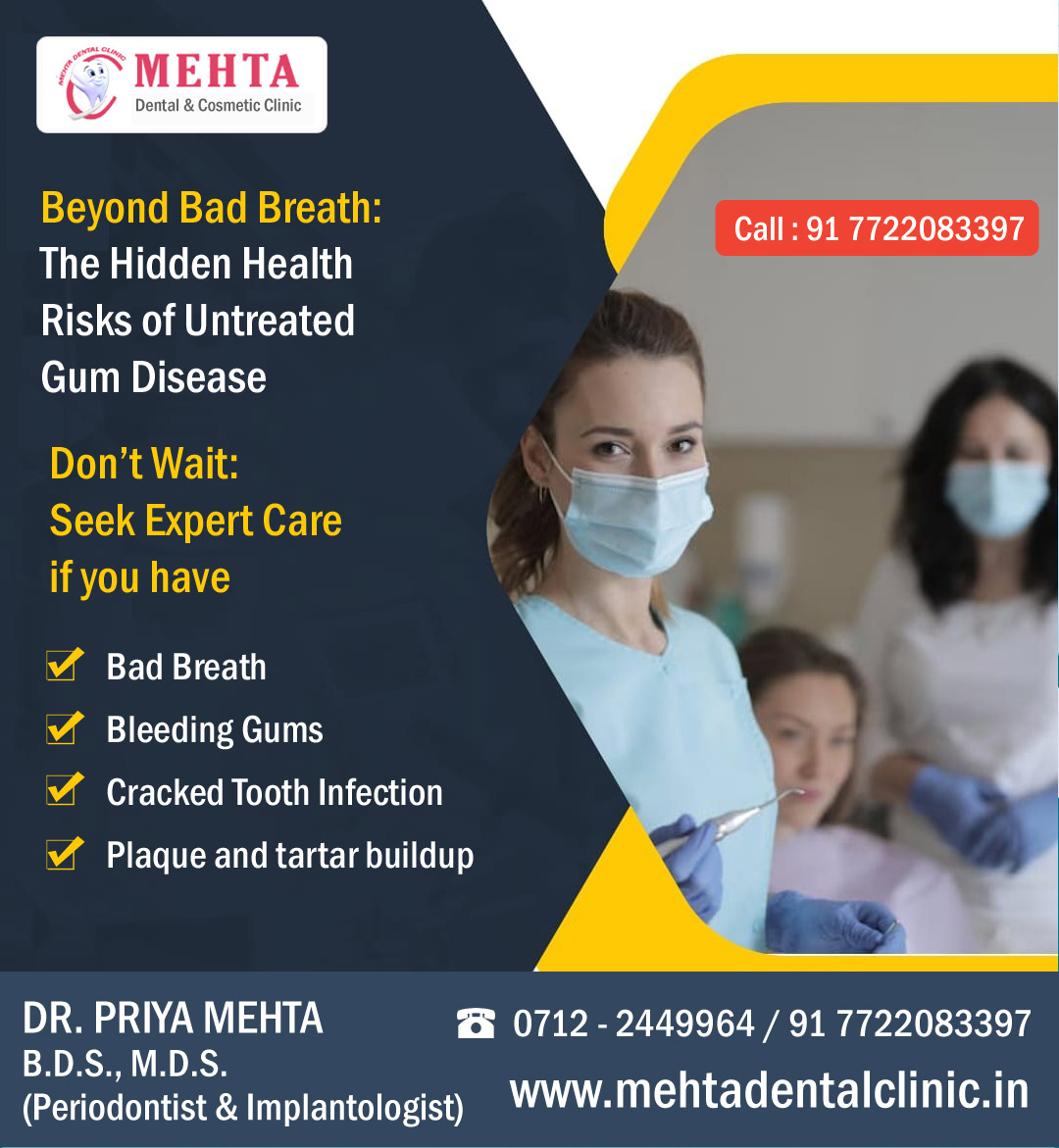
Beyond Bad Breath: The Hidden Health Risks of Untreated Gum Disease
We all know bad breath can be embarrassing. And for many, it’s the first glaring sign that something might be off with their oral hygiene. But what if that persistent bad breath isn’t just a social nuisance, but a whisper of a far more serious problem brewing beneath the surface? Often, bad breath remedies treatment focuses on quick fixes, while the true culprit, gum disease, continues its silent, destructive work.
Gum disease, also known as periodontal disease, is a common condition affecting millions worldwide. It starts innocuously as gingivitis, with symptoms like bleeding gums during brushing or flossing. If these early warning signs are ignored and effective bleeding gums treatment isn’t sought, the disease can quietly progress to advanced stages, posing significant risks not just to your teeth, but to your entire body. Let’s delve into the hidden health risks that lie beyond bad breath when gum disease goes untreated.
The Silent Destroyer: How Gum Disease Progresses
Initially, plaque — a sticky film of bacteria — builds up on your teeth, irritating your gums and leading to gingivitis. This is where you might notice bleeding gums and slight swelling. At this stage, regular dental hygienist treatment (like scaling and root planing) and diligent home care can often reverse the condition.
However, if left unchecked, gingivitis can advance to periodontitis. In this more severe form, the inflammation spreads below the gum line, creating pockets where bacteria thrive. These bacteria, along with your body’s inflammatory response, begin to destroy the bone and supporting tissues that hold your teeth in place. This can lead to loose teeth, receding gums, and eventually, tooth loss. A gum disease specialist is crucial for managing these advanced stages, often recommending procedures like Flap surgery or Bone grafts for gum disease to save teeth.
Hidden Health Risks Beyond Your Mouth
The most alarming fact about untreated gum disease is its systemic impact. The chronic inflammation and bacteria from your infected gums don’t stay confined to your mouth; they can enter your bloodstream and contribute to a host of serious health problems throughout your body:
- Heart Disease and Stroke: This is one of the most well-documented links. The bacteria from your gums can travel to your heart arteries, contributing to plaque buildup and inflammation, which increases your risk of heart attacks and strokes.
- Diabetes Complications: There’s a bidirectional relationship between gum disease and diabetes. Severe gum disease can make it harder for people with diabetes to control their blood sugar levels, increasing their risk of diabetic complications. Conversely, uncontrolled diabetes can worsen gum disease.
- Respiratory Problems: Bacteria from infected gums can be inhaled into the lungs, potentially leading to respiratory infections such as pneumonia, especially in older adults or those with compromised immune systems.
- Increased Risk in Pregnancy: For expectant mothers, untreated gum disease has been linked to an increased risk of preterm birth and low birth weight. Managing gum health is a critical part of prenatal care.
- Rheumatoid Arthritis Exacerbation: Some studies suggest a connection between gum disease and inflammatory conditions like rheumatoid arthritis, where the bacteria from the mouth may contribute to systemic inflammation.
- Kidney Disease: Emerging research indicates a possible link between severe gum disease and chronic kidney disease, although more studies are needed to fully understand this connection.
- Increased Risk of Certain Cancers: While research is ongoing, some studies suggest a potential link between chronic inflammation from gum disease and an increased risk of certain cancers, including esophageal, head and neck, and pancreatic cancers.
Don’t Wait: Seek Expert Care
Recognizing the severity of these hidden risks underscores the importance of prompt action. If you have bleeding gums, persistent bad breath, or suspect you have gum disease, do not delay seeking professional help. A gum disease specialist can accurately diagnose your condition and provide tailored gum disease treatment.
Beyond gum health, our comprehensive dental care extends to resolving other painful issues like an abscessed tooth treatment or cracked tooth infection, often requiring an Endodontist or RCT doctor. Once your oral health foundation is strong, a top cosmetic dentist can help you enhance your dental aesthetics through professional teeth whitening to address yellow teeth, dental repair bonding to fix minor imperfections or gaps between teeth, contributing to a complete smile designing.
Your oral health is integral to your overall well-being. Don’t let bad breath be your only concern; understand that bleeding gums are a vital warning sign that demands immediate attention.

